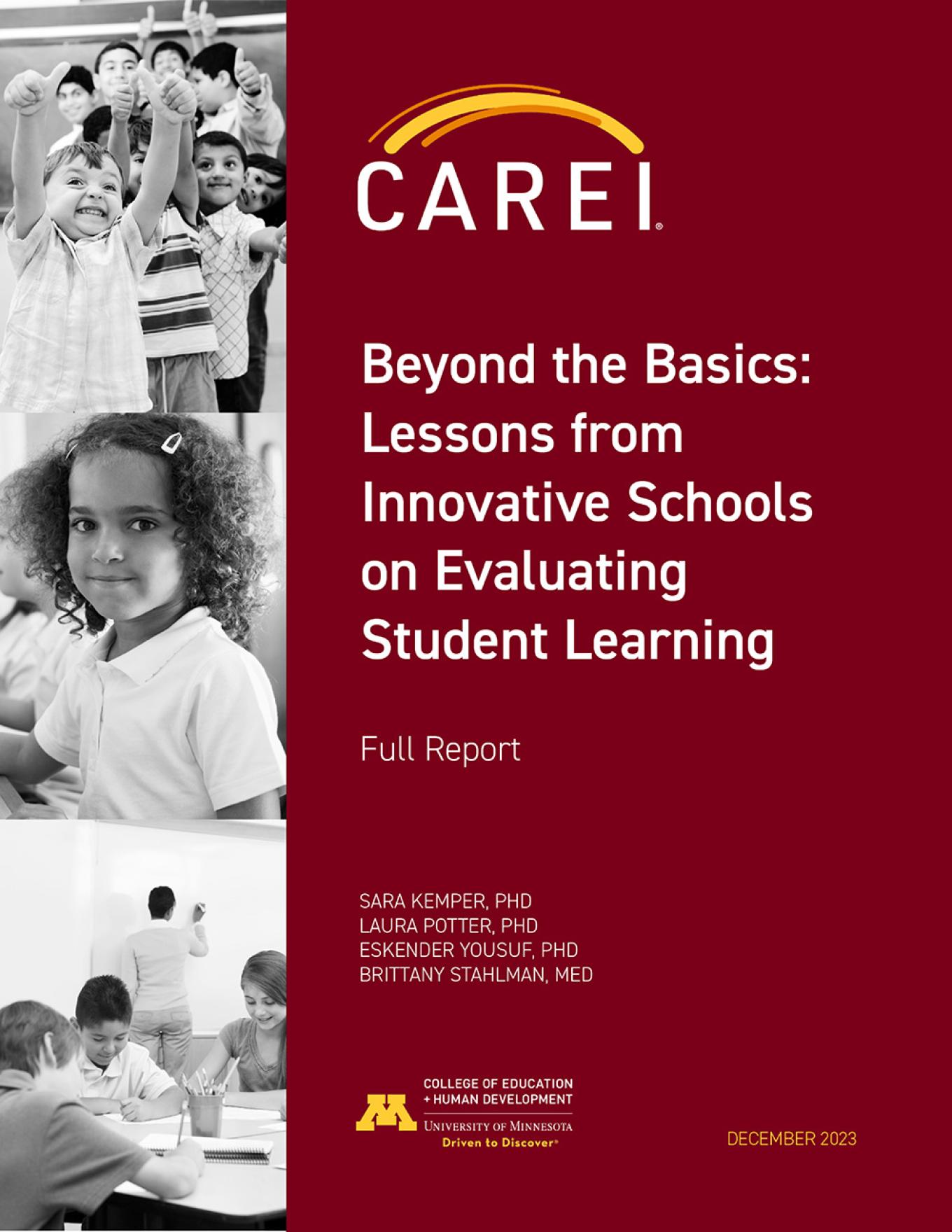Evaluating student learning beyond the basics
Educational leaders across the country are catching on to the idea that traditional grading practices and standardized tests do not adequately capture the scope of what young people know and can do. With funding from The Civic Affairs Trust, researchers at the University of Minnesota have developed two resources to rethink and improve the evaluation of student learning in schools.
“Academic learning isn't the only outcome of a public education that matters to families and communities,” says Sara Kemper, Research Associate at the UMN Center for Applied Research and Educational Improvement (CAREI). “By the time they graduate, we want our young people to be able to navigate college and the workplace, solve complex problems, and contribute to their communities, among other skills.”
Beyond the Basics: Lessons from Innovative Schools on Evaluating Student Learning identifies ways to evaluate student learning that more thoroughly reflect the breadth and specificity of learning outcomes that our society expects from schools, and that students want for themselves. Kemper and her co-authors looked at case studies of five U.S. schools and districts currently implementing innovative student evaluation systems. A companion guide, Evaluating Student Learning “Beyond the Basics” is intended for PreK-12 leaders interested in exploring innovative approaches to evaluating student learning. Specifically, it identifies practices in evaluating learning beyond academics, including career readiness skills, social and emotional competencies, and other important outcomes.
Report and guide
Educational leaders across the country are catching on to the idea that traditional grading practices and standardized tests do not adequately capture the scope of what young people know and can do. These schools and districts are experimenting with new models for assessing learning and communicating results with students and families. This project aimed to unearth promising practices in the evaluation of student learning that more thoroughly reflects the breadth and specificity of learning outcomes that our society expects from schools, and that students want for themselves.
Main report (2023)
Beyond the Basics: Lessons from Innovative Schools on Evaluating Student Learning identifies promising practices for addressing the shortcomings of prevailing evaluation structures, along with tools and approaches, applications, and evidence-based recommendations.

- Acknowledgments 5
- About the Authors 5
- Vignette 6
- Introduction 7
- The Case for Reimagining Student Evaluation 7
- Prevailing Evaluation Structures and their Shortcomings 9
- The Carnegie Unit: Success as Seat Time 10
- Standardized Tests: Success as Performance in Narrow Academic Domains 11
- Consequences 12
- Public Opinion 14
- Prevailing Evaluation Structures and their Shortcomings 9
- Promising Practices in the Evaluation of PreK-12 Student Learning 15
- Phase I: Defining Meaningful Learner Outcomes 15
- Universal Competency Domains 15
- Individualized Competency Domain 16
- Portrait of a Graduate 16
- Phase II: Designing Systems to Evaluate Student Learning 17
- Criterion 1: Empowering 19
- Criterion 2: Aligned 20
- Criterion 3: Meaningful 21
- Criterion 4: Multiple Ways 23
- Criterion 5: Rigorous 24
- Criterion 6: Feasible 25
- Phase I: Defining Meaningful Learner Outcomes 15
- Tools and Approaches for Planning, Evaluating, and Reporting Student Learning 27
- Tools and Approaches for Determining Learning Targets (Phase I) 27
- Tools and Approaches for Evaluating Learning (Phase IIa) 30
- Tools and Approaches for Summarizing and Communicating Learning (Phase IIb) 32
- Summary 34
- Applications in Schools and Districts 35
- Capstone Projects at Cañon City High School – Cañon City, CO 35
- Mastery-Based Assessment at Brooklyn International High School – New York City, NY 37
- Del Lago Academy – Escondido, CA 38
- Evaluating Students with Learning Differences at Lionsgate Academy – Minnesota 40
- Balanced Assessment in Spring Lake Park Schools – Spring Lake Park, MN 42
- Synthesis of Findings from Case Studies 43
- Recommendations 45
- Start with the End in Mind 45
- Engage Others 45
- Evaluate Existing Student Evaluation Systems 45
- Consider Viable Alternatives to the Carnegie Unit 46
- Embrace Competency-Based Grading Practices 46
- Get Inspired 47
- Prioritize 47
- Beware the Naysayers 47
- Tap Teachers 48
- Start Small 48
- Final Thoughts 49
- References 50
- Appendix A: Guiding Questions and Methodology 60
- Appendix B: Example Competency Domains and Portraits of a Graduate 63
- Appendix C: Cañon City Capstone Rubric 67
- Appendix D: Mastery-Based Assessment Measures at BIHS 71
- Appendix E: Del Lago Academic Internship Program Overview 73
- Appendix F: Lionsgate Academy IEP Reporting Document & Summary 75
- Appendix G: Spring Lake Park Balanced Framework & Student Portrait 78
- Appendix H: Sources of Assessment Data 80
Companion guide (2023)
Evaluating Student Learning ‘Beyond the Basics’ is intended for PreK-12 leaders interested in exploring innovative approaches to evaluating student learning. Specifically, it identifies ways to evaluate learning beyond academics that can be implemented in schools.

- Introduction
- The Case for Reimagining Student Evaluation
- Promising Practices in the Evaluation of PreK-12 Student Learning
- Phase I: Defining Meaningful Learner Outcomes
- Phase II: Designing Systems to Evaluate Student Learning
- Tools and Approaches
- Determining Learning Targets (Phase I)
- Evaluating Learning (Phase IIa)
- Summarizing and Communicating Learning (Phase IIb)
- What Schools are Doing
- Recommendations
- Start with the End in Mind
- Engage Others
- Evaluate Existing Student Evaluation Systems
- Consider Viable Alternatives to the Carnegie Unit
- Embrace Competency-Based Grading Practices
- Get Inspired
- Prioritize
- Beware the Naysayers
- Tap Teachers
- Start Small
- Conclusion
About the authors
Eskender Yousuf
Research Associate, CAREI
Brittany Stahlman
Brittany Stahlman, M.Ed., focuses her research on school culture, teacher development, and schoolwide policy implementation. She is an educator with over ten years experience teaching secondary language arts within a racially and economically diverse Twin Cities school district.
Laura Potter
Laura Potter's experience includes serving as a School Psychologist and site-based Multi-Tiered Systems of Support (MTSS) Lead in Minneapolis Public Schools as well as conducting program evaluation work with several Minneapolis nonprofit organizations.
